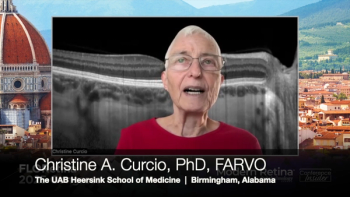
ASRS 2024: Assessing retinal vascular changes in alzheimer disease with radiomics: A preliminary study of fundus photography
Sruthi Arepalli, MD, spoke with Modern Retina about her presentation, "Assessing retinal vascular changes in alzheimer disease with radiomics: A preliminary study of fundus photography" at the annual ASRS meeting in Stockholm, Sweden.
Sruthi Arepalli, MD, spoke with Modern Retina about her presentation, "Assessing retinal vascular changes in alzheimer disease with radiomics: A preliminary study of fundus photography" at the annual ASRS meeting in Stockholm, Sweden.
Video Transcript:
Editor's note: The below transcript has been lightly edited for clarity.
Sruthi Arepalli, MD:
Hi, everyone. I'm Sruthi Arepalli, an assistant professor at Emory University at the ASRS. This year, I had the pleasure of presenting our research, which looked at retinal vascular changes in patients with Alzheimer's disease. And essentially what we were able to find is that patients with Alzheimer's disease tend to have more complexity to their architecture of their blood vessels. And this was particularly prominent when we looked at their arteries alone, and compared them to patients who are considered cognitively normal.
We also wanted to know if these features correlated with their cerebrospinal fluid, which is the gold standard for diagnosis for Alzheimer's disease. And we saw that the increased level of complexity or entropy of their blood vessels was correlated to certain proteins that become elevated in Alzheimer's disease. And we also found that using these 2 markers in conjunction with each other are the best to discriminate out patients with Alzheimer's as compared to those who are cognitively normal.
The usage of AI is really incredible because it can help us select out patients, particularly Alzheimer's patients that are earlier on in their disease process. One of the devastating things about Alzheimer's disease is that these patients get cognitive deficits that occur very late in their disease. And so if we can find a biomarker like the retina to target earlier, we may be able to find their disease earlier as well.
So our data was based on a study that was already ongoing through the Emory Center, it was called the Emory Brain Health Study. And so what we had done was we had placed fundus imaging equipment within the neurology department that was already seeing these patients to get their baseline images. And then we retrospectively went back and looked at them, because ours was just sort of a snapshot image of a patient who had come in for a visit. And so all together, we're able to show that there's increased complexity, but we were not able to longitudinally track them in this portion of the study.
You know, we're still in the early processes of delineating what features to look out for for defining early onset Alzheimer's disease, but it is promising that we have some potential tips. I think we still have to fine tune a lot of the exclusivity criteria and what to filter out when we look at these patients but it's an exciting time.
Newsletter
Get the essential updates shaping the future of pharma manufacturing and compliance—subscribe today to Pharmaceutical Technology and never miss a breakthrough.




























